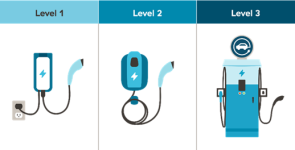Home charging options for EVs vary in cost and safety depending on the region, local regulations, and availability of products. Here’s a breakdown of cheap but safe home charging options for different regions:
1. USA
Options:
Level 1 Chargers (120V): Plug into a standard household outlet for slow charging. Ideal for small EVs or plug-in hybrids.
Brands: JuiceBox 32 Lite, ChargePoint Home Flex.
Approx. Cost: $300–$500.
Level 2 Chargers (240V): Require installation of a 240V outlet. Faster charging and more efficient.
Brands: Grizzl-E Classic, Emporia Smart EV Charger.
Approx. Cost: $500–$800 (plus $500–$1,500 installation).
Safety Tip: Install with a certified electrician to ensure proper grounding and adherence to local codes.

2. Europe & UK
Options:
Mode 2 Charging Cables: Plug into standard outlets but use a portable EVSE with safety features.
Brands: Ohme Home Pro, Zappi by myenergi (solar-compatible).
Approx. Cost: €400–€800 (£350–£700).
Wallbox Chargers: For faster charging (up to 22 kW, depending on home power supply).
Brands: Wallbox Pulsar Plus, Pod Point.
Approx. Cost: €500–€1,200 (£450–£1,100).
Safety Tip: Many countries offer government subsidies for EV charger installation, reducing costs.
3. South America
Options:
Portable EV Chargers: Compatible with existing 110V or 220V outlets.
Brands: Besen Portable Charger, generic models (check for UL or CE certifications).
Approx. Cost: $300–$600.
Wall Chargers: Limited local availability; consider international brands like Wallbox or Schneider Electric.
Approx. Cost: $700–$1,200.
Safety Tip: Ensure voltage compatibility (220V is common), and use surge protectors due to power fluctuations.
4. Australia
Options:
Wall-Mounted Chargers: The most common and reliable solution.
Brands: Delta AC Mini, Tesla Wall Connector (compatible with non-Tesla vehicles via adapters).
Approx. Cost: AUD 800–1,500.
Portable Chargers: For 10A or 15A outlets.
Brands: JETCharge, EVolution Portable EVSE.
Approx. Cost: AUD 500–900.
Safety Tip: Install a Residual Current Device (RCD) for added protection.
5. Asia
Options:
Portable Chargers: Widely used due to compact urban living.
Brands: BYD, Delta Electronics, Besen.
Approx. Cost: $200–$500.
Wall Chargers: Installed in parking areas of apartments or standalone houses.
Brands: Tata Power EZ (India), KEBA (widespread in East Asia).
Approx. Cost: $500–$1,000.
Safety Tip: Ensure compatibility with local plug types (Type A, B, or G plugs are common).
6. General Recommendations
Universal Brands: JuiceBox, Wallbox, Grizzl-E, and Tesla Wall Connector (widely compatible).
Smart Features: Choose models with Wi-Fi or Bluetooth for scheduling, energy tracking, and remote control.
Installation: Always hire certified electricians to install wall chargers or verify that the outlet and circuit are capable of handling the EV's load.
Rebates/Grants: Many regions (e.g., USA, UK, EU countries) offer incentives to offset charger and installation costs.
1. USA
Options:
Level 1 Chargers (120V): Plug into a standard household outlet for slow charging. Ideal for small EVs or plug-in hybrids.
Brands: JuiceBox 32 Lite, ChargePoint Home Flex.
Approx. Cost: $300–$500.
Level 2 Chargers (240V): Require installation of a 240V outlet. Faster charging and more efficient.
Brands: Grizzl-E Classic, Emporia Smart EV Charger.
Approx. Cost: $500–$800 (plus $500–$1,500 installation).
Safety Tip: Install with a certified electrician to ensure proper grounding and adherence to local codes.

2. Europe & UK
Options:
Mode 2 Charging Cables: Plug into standard outlets but use a portable EVSE with safety features.
Brands: Ohme Home Pro, Zappi by myenergi (solar-compatible).
Approx. Cost: €400–€800 (£350–£700).
Wallbox Chargers: For faster charging (up to 22 kW, depending on home power supply).
Brands: Wallbox Pulsar Plus, Pod Point.
Approx. Cost: €500–€1,200 (£450–£1,100).
Safety Tip: Many countries offer government subsidies for EV charger installation, reducing costs.
3. South America
Options:
Portable EV Chargers: Compatible with existing 110V or 220V outlets.
Brands: Besen Portable Charger, generic models (check for UL or CE certifications).
Approx. Cost: $300–$600.
Wall Chargers: Limited local availability; consider international brands like Wallbox or Schneider Electric.
Approx. Cost: $700–$1,200.
Safety Tip: Ensure voltage compatibility (220V is common), and use surge protectors due to power fluctuations.
4. Australia
Options:
Wall-Mounted Chargers: The most common and reliable solution.
Brands: Delta AC Mini, Tesla Wall Connector (compatible with non-Tesla vehicles via adapters).
Approx. Cost: AUD 800–1,500.
Portable Chargers: For 10A or 15A outlets.
Brands: JETCharge, EVolution Portable EVSE.
Approx. Cost: AUD 500–900.
Safety Tip: Install a Residual Current Device (RCD) for added protection.
5. Asia
Options:
Portable Chargers: Widely used due to compact urban living.
Brands: BYD, Delta Electronics, Besen.
Approx. Cost: $200–$500.
Wall Chargers: Installed in parking areas of apartments or standalone houses.
Brands: Tata Power EZ (India), KEBA (widespread in East Asia).
Approx. Cost: $500–$1,000.
Safety Tip: Ensure compatibility with local plug types (Type A, B, or G plugs are common).
6. General Recommendations
Universal Brands: JuiceBox, Wallbox, Grizzl-E, and Tesla Wall Connector (widely compatible).
Smart Features: Choose models with Wi-Fi or Bluetooth for scheduling, energy tracking, and remote control.
Installation: Always hire certified electricians to install wall chargers or verify that the outlet and circuit are capable of handling the EV's load.
Rebates/Grants: Many regions (e.g., USA, UK, EU countries) offer incentives to offset charger and installation costs.
